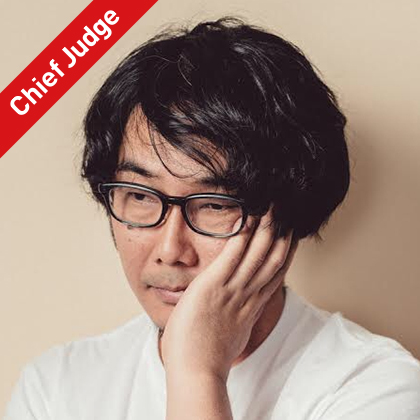About YouFab
We are calling for entrants from around the world that challenge
the idea of what is sensible and “hack” the common sense model.
We look forward to seeing entries that align with this spirit.
Polemica!! How do you rebel? And against what?
When 3D printers became widely known around the world, one first reaction was that people started to think, "From now on, we'll be able to make anything with digital fabrication!" The first thing that then caused unease was the idea that idiots would use digital fabrication to make guns. And indeed, 3D printed guns appeared immediately. And they were certainly capable of killing. That being said, if the highly valuable 3D printing technology was only being used to industriously produce some sort of equipment for violence, it would make such new technology untenable. I understand that the YouFab Award was established with the mission of spreading digital fabrication around the world, not as something which supports violence, but rather as something which supports a new "aesthetic". I believe it’s an honest mission.
I think this mission can be looked at in yet another way. With digital fabrication and the "democratization of manufacturing" brought about by it, if anything, the fact that anyone can make a
The concept "making things = manufacturing" of our current industrial society came about by the leadership of various countries and enterprises with large amounts of capital. These countries and enterprises also possess technology and production lines, leading to the monopolization of the market. In this situation, consumers cannot be involved in making things for themselves, so in order to get what they truly want, the only thing consumers can do is some sort of hacking of existing goods.
However, as technology becomes more common and less expensive, Making gradually ceases to be something led by "them," and becomes something led by "us." The spirit at the root of digital culture, which originated with the hippie movement on the West Coast of the United States, is the dream of recreating our lives for ourselves with our own hands, using the tools we have obtained. At the center of movements for freedom and autonomy, computers and the internet are, above all, "tools for rebellion" against the government and existing industries.
Chris Anderson, former editor-in-chief of the American edition of "WIRED," who spread the concept of "makers" to the world, spent his school days in Washington DC during the flourishing of the punk movement.
What happened during the late 70s and early 80s (actually, all over the world, and even here in Japan) was that the cost of recording equipment became something which students and young people could afford, making it possible for anyone to produce and transmit extreme hardcore music, which could have never happened in the past. As an antithesis to the existing music industry, it instantly captured the hearts of young people. In the raw sound, recorded on a cheap MTR, and in handmade leaflets printed with a copy machine, it was there in the world of DC punk that Chris Anderson says he learned all about the D.I.Y. spirit that would lead to the "makers' movement".
The most important thing here is the fact that thrusting an intense "NO" at the current state of existing industries and what they create will become something which can also be done by the smallest individual. This is where the value of being independent, and being D.I.Y., lies. Can we not find a sense of "aesthetics" in there too? The music of Minor Threat and Bad Brains, known as the leaders of DC punk, may have been little more than noise when viewed with the criteria of existing music of the time. However, there is also freedom in asking again if the "standard of beauty" set in the past is really the aesthetic we are seeking now.
In this way, it can be said that the essence of digital fabrication, which computers and the internet were once hoped, and expected to represent, is resistance and rebellion against authority and the current situation. A tool to dream of alternatives to the current situation. If this is the case, even if you make something with a 3D printer, unless you look at it with this attitude in mind, it makes the invaluable 3D printers untenable.
This year's theme, "Polémica!", emulates the name of a former collaborative project between Loftwork Inc. and the Japanese edition of "WIRED". Polémica refers to "controversy" and "tumultuous debate". I decided on this theme for this year’s YouFab because I would like to call for entries which acutely question the current state of affairs and present alternatives to the status quo. It doesn't matter if it's distorted or immature, as new questions are always unstable and give rise to a mix of pros and cons.
Why did you make what you made? What status quo are you rebelling against? What I believe needs to be challenged is the strength and depth of this questioning.

Kei Wakabayashi
Editor
Kei Wakabayashi was born in 1971 and spent his early childhood in London and New York. After graduating from the School of Humanities and Social Sciences in French Studies at Waseda University, he joined Heibonsha, and became part of the editorial department for "Gekkan Taiyo." In 2000, became an independent editor. Afterward, he edited a wide range of publications, including magazines, books, and exhibition records, and became active as a music journalist. He was assigned as the Chief Editor for the Japanese edition of "WIRED" in 2012, and left the post in 2017. In 2018, he launched blkswn publishers, Inc. and authored the book, "Sayonara Mirai" (Goodbye, Future), published by Iwanami Shoten (April 2018).
Organized by FabCafe
Tokyo, Kyoto, Hida, Taipei, Bangkok, Barcelona, Toulouse, Strasbourg, Singapore, Monterrey. FabCafe is a creator's cafe network, extending 10 locations around the world. At the FabCafes, unique creators gather, meet, pit their talents against each other, and give presentations on their ideas and creations every day. Since the beginning, the FabCafe Global Network has supported the birth of over 15,000 ideas by holding a various kind of creative workshops and events, all while also offering delicious coffee and comfortable spaces to relax.
The YouFab Global Creative Awards is a compilation of the year's activities. Curators at each location call out to creators they have met and networked within that year to compile a number of impressive submissions from around the world.
At the same time, we are discovering and supporting creators who are likely to change the next generation by recognizing and celebrating their unique works. The large number of YouFab winners so far are connected globally through winning the YouFab Award and their field of activities have expanded.
From Local to Global, Global to Local.
We believe that the next generation of talent is not only born from advanced research facilities or university labs, but also from small towns and communities around the world. The transmission from local to global returns results back to the local. Through this cycle, YouFab is ever becoming more supportive of the world's creatives, as well as international creative businesses.

Toshiya Fukuda
Hakuhodo Fellow / Chief Creative x Technology Officer
Osaka University of the Arts Professor of Design
Triple Seven Creative Strategies Co., Ltd. Representative Director
Co-Founder of FabCafe
Toshiya is a professional in communication planning, directing and consulting media platforms. His own company, 777 Interactive, responds to the cutting-edge demands of companies and he considers the future of fabrication through FabCafe. He also raises next-generation creators at Hakuhodo and teaches digital design at Osaka University of Arts. His exemplary efforts are highly regarded overseas and has been awarded multiple international design awards and has taken part as a judge for such awards.



